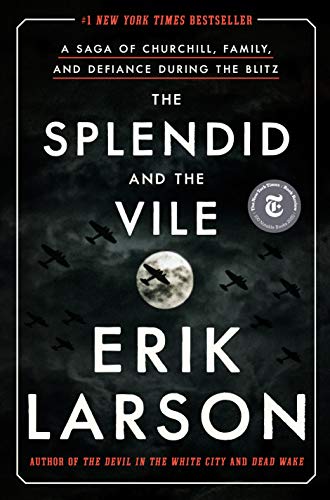The Splendid And the Vile
ISBN: 978-0385348713

There are books that exist that are reads and then there are books that exist that are experiences. The Splendid and The Vile is most assuredly the latter. It is not simply history one is reading, but a moment in time brought to life by an author who has spent a long time performing the research to understand the work. Indeed, it appears that from the idea of the book–that is to say the first decision that such a book needed to be written to publication according to the author’s statement–was an interval of 20 years. He mentions that moving to New York and experiencing 9-11 was his impetus. It was a decision well-made.
Churchill’s England in the dawn of WWII is usually told from America’s entry into the war forward. It therefore misses much of what Britain was undergoing previous to the entry of America. Much of the text indicates Churchill’s firm conviction that America would have to enter the war one way or another in order for a military victory to be possible. Though Churchill must bolster the strength of his own nation so as to make it not appear needy, it is clear that behind the scenes there was a desperation as the casualties and consequences of the bombing of London began to mount. Clearly, the pride of the historical relations between America and England had to be submitted to a greater threat in order to find unity and cooperation against a danger to both nations.
What makes Larson’s writing pop off the page are the little bits of details he has unearthed. In one instance where are thrust into a nightclub where some of the London’s upper class are trying to escape from the realities of the war only in the next instance to finding their entire escape a scene of horror and destruction as a bomb crashes through the roof and kills those who were seconds before out for a good night on the town. We learn that those left are in some way unfazed by this or shocked such that they simply go somewhere else to continue to the party assuming that those who died wanted them to do so. One of the patrons even remarks how “bizarre” this course of action feels in hindsight.
We also learn about other people who are trying to live life in London that are caught up in the middle of the war with a variety of everyday responses–from resolve to victimization. We learn about coping strategies which evidently included a whole lot of sex in the face of immense amounts of destruction. We learn about the struggles with Churchill’s own family and children, and strangely we also learn how Churchill seems to be animated by the backdrop of all these factors–like his unique destiny was to manage this crisis which would disturb anyone else to the point of being nonfunctional. The way he manages his own self during this time is with alcohol, baths, and cigars.
In the meantime, there are car wrecks and explosions and destruction and yet when Churchill comes to view the scenes the people seem to love him despite all terrible hardships. Perhaps this is because Churchill frankly states that the only thing he has to offer from the onset is “blood, sweat, toil and tears”. He certainly delivered on that promise, although he tried to mitigate it to the best of his ability. Like many leaders before a crisis, he is prevented from solving the issue in part by the parties and politicians around him. We see that it does in fact, wear on him, and that he does love the people who are being blown to bits.
He “beams like a young boy” when he gets to test fire new military weapons, and he presses forward on various military strategy and weapons he believes will help Britain win the war. He is a huge fan of technology and innovation, and creates some ideas of his own about how to more effectively kill the enemy he faces. Our modern sensibilities may find this macabre, but from the perspective of winning a war, one does what one must.
Though not featured on thebooklight, the reading of this work came with a familiarity of Larson’s previous work. Though those works were good, this is, undoubtedly, the best of his work to date. Because this book was published by such a large publisher, there are plenty of cheap copies floating around out there. Do not, however, let you think that this book is therefore somehow “not quality”. Indeed, there are a million ways to spend around five dollars that will not enrich one’s life and understanding nearly as much.
Perhaps one of the last sentences of the book where Churchill is found to discover one of the children in his retinue to have been given a gift of a model train best sums up the entirety of the read. He tells the child to finish putting his tracks together. Then, he instructs him to place one of the train engines on the track. Noticing he has another train engine, he then tells the child to put that engine also on the track. Then, setting down next to the child, he says simply “Now, let’s have a crash!” Destruction, on some level, was Churchill’s play. It was a good thing he was who he was, when he was, or else, the world in which we live would be quite different indeed.
